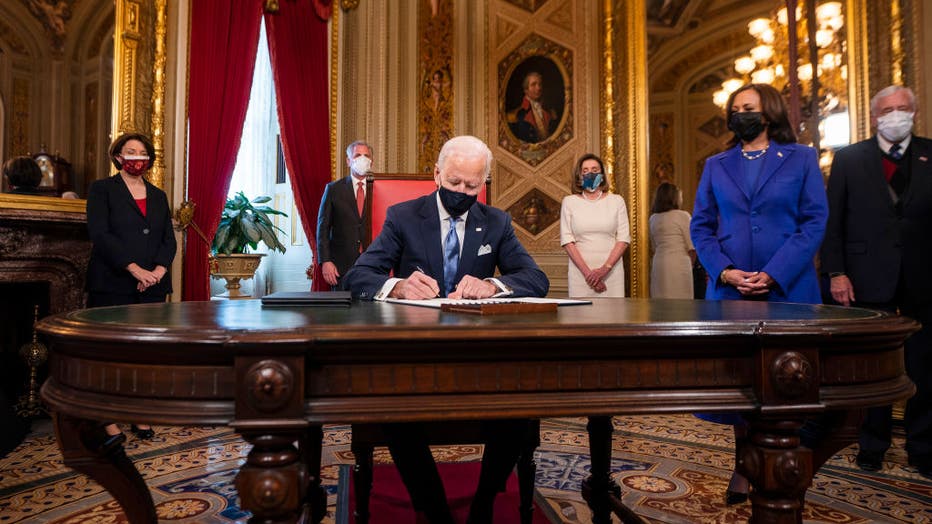President Biden takes actions to combat the impacts of the COVID-19 pandemic
WASHINGTON - On Inauguration Day, President Joe Biden pledged to make combating COVID-19 his top priority.
He is bringing the Coronavirus Task Force into the White House, and he promised to get 100 million vaccine doses distributed in his first 100 days.
In the weeks leading up his inauguration, Biden has said that he intends to take swift action to address the health and economic fallout brought on by the pandemic, and on his first day in office, he did just that.
During his inauguration speech, Biden talked about the difficult road ahead for his administration and the country.
"This is our historic moment of crisis and challenge," Biden said.
Among his first actions in office, Biden signed a series of executive orders related to the U.S. government's response to the pandemic.

WASHINGTON, DC - JANUARY 20: US President Joe Biden signs three documents including an Inauguration declaration, cabinet nominations and sub-cabinet noinations, as US Vice President Kamala Harris (R) watches in the Presidents Room following the 59th
Dr. Timothy Bray is director of urban policy research at UT Dallas.
"We've got unprecedented challenges right now," he said.
He's not surprised the Biden White House is bringing back an Obama-era position called the Directorate for Global Health Security and Biodefense, which was organized after the 2014 Ebola epidemic, a health crisis that gripped the city of Dallas.
Biden will also formally implement a response coordinator who will report to the President on all things COVID-related.
"In the Executive Branch, its uniquely situated to coordinate resources across agencies," Dr. Bray explained.
Biden is also rejoining the World Health Organization, which the Trump administration was in the process of leaving, and making Dr. Anthony Fauci the top U.S. delegate.
"This is an opportunity for us to continue to dialogue and collaborate with our peers around the world," Dr. Bray said.
The Biden White House will also focus on financial relief for Americans.
To do this, Biden will call on the Centers for Disease Control and Prevention to re-implement and extend the already defunct federal moratorium on evictions and foreclosures until at least March 31.
"This is absolutely essential. We've been engaged in a project studying the impact of the city of Dallas' foreclosure protections, and I can tell you firsthand, it is absolutely essential that we provide some sort of protections for these families who are dealing with the potential loss of a home," Dr. Bray added.
Biden will also call on the Departments of Agriculture, Housing and Urban Development, and Veterans Affairs to extend the foreclosure moratoriums for their federally backed mortgages.
That includes some 11 million homeowners nationwide.

